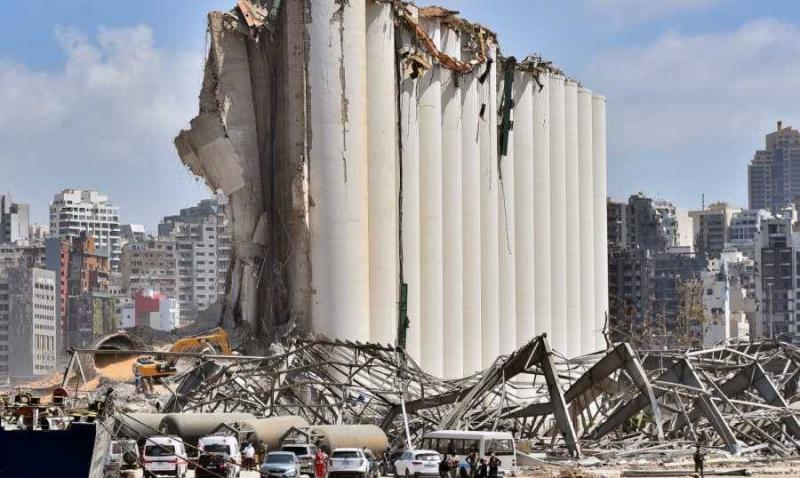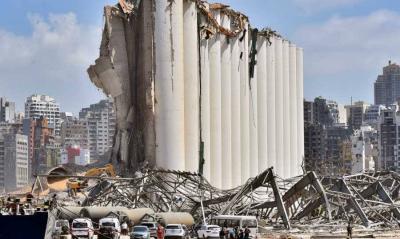The French Embassy in Lebanon will launch the strategic plan for the Port of Beirut on March 13, including suggestions related to organizing the port and guidelines for assessing its security. This plan was prepared by French private companies funded by the French state, as reported by "Al-Jumhuriya." Despite four years passing since the Beirut port explosion and the persistent lack of justice, the government has not taken any action regarding the removal of debris, nor has it commenced any reconstruction efforts. In contrast, the French state has initiated a strategy for rehabilitating the port, creating a new engineering map under the oversight of the Ministry of Public Works and the port management authority, which will be revealed at an event held next Wednesday at the port with the participation of officials and a large crowds.
As a preliminary step for the event, the French Embassy in Lebanon held a small media meeting in which some details regarding this project were shared. François Spurier, the head of the regional economic department at the French Embassy, stated that after the port explosion, several studies and plans were conducted by various public and private parties for the rehabilitation of the port, but Minister of Public Works Ali Hamieh was not satisfied with them. Therefore, during a meeting with him about a year and a half ago, he requested our assistance in formulating a practical strategy for the port's rehabilitation, taking into account the need for a realistic plan that aligns with the financial capabilities of the Lebanese state.
In response, the French state selected the consultants and collaborated with Egis, Artelia, and Electricité de France to provide the port with power, developing the required plan with French funding under the directions of Minister Hamieh, in communication and cooperation with the port management authority. Spurier explained that it was not required to conduct a new study, but rather to draw inspiration from existing studies, extracting the good elements and proposing two or three options. Accordingly, work was focused on three areas:
1. Identifying essential works for rehabilitating the port and rebuilding the damaged quays, particularly Quay 9, which suffers from a significant gap.
2. Developing an organizational plan for operations and transportation within the port to increase efficiency and save time during operations.
3. Energy-related issues, revealing that the port consumes between 14 and 15 megawatts through polluting generators. Thus, we worked with Electricité de France to supply the port with solar power, and studies regarding the available areas for solar panel installation have been completed.
According to "Al-Jumhuriya," the official project proposes either building a new quay to replace the completely destroyed Quay 9 or constructing a quay on the parallel line, with port authorities leaning towards the second option. This includes the creation of a specific area, corridors, a seed storage area (grain silos), and spaces designated for parking imported vehicles, which will be topped with solar panels providing energy to the port, as well as a new gate dedicated to containers and access for visitors.
Spurier confirmed that port authorities have been briefed on this plan, which will be officially announced on March 13 by experts from Egis and Artelia, revealing the total costs for these works (including the rehabilitation of the quay, roads, and solar energy provision), which range between 50 and 100 million dollars. He said that on the announcement day, we will provide the Lebanese authorities with three documents:
1. All studies and plans completed regarding the works and actions to be taken in the port.
2. All the tenders that the Lebanese state must launch later.
3. An assessment of security and safety in the port, noting that according to experts, the existing safety standards at the Port of Beirut do not meet the required international standards, causing international transport companies to hesitate to pass through Beirut's port due to potential extra scrutiny.
He added that adapting this port to international standards is not costly; it only requires updating certain equipment and undertaking some administrative procedures to meet international criteria.
Regarding what will happen after March 13, Spurier confirmed that the French side is fully prepared to continue working and providing additional information and documents. However, before moving forward with this cooperation, the Lebanese authorities must meet three preconditions. The first is to remove the debris and rubble, as it still fills the port four years after the explosion. He revealed that last week, a tender was launched approved by the public procurement authority to collect metal waste from the port.
The second condition relates to financing, as currently 80% of the port's revenues go to the state treasury, leaving only 20% for the port, which is insufficient for its rehabilitation. Therefore, a reconsideration of the distribution of these percentages between the Lebanese state and the Port of Beirut is needed, especially since there is currently no funder ready to finance this project due to Lebanon's lack of an agreement with the International Monetary Fund.
Spurier mentioned that moving forward with this project requires searching for local financing, amounting to 100 million dollars divided over three years. He added that this is directly related to the third condition, which is establishing a solid and transparent legal and regulatory framework, as the current one is insufficient. To secure funding, a flexible format must be prepared to avoid investors entering the labyrinth of Lebanese administrations to obtain approval for this project.
In terms of emergency and rapid assistance provided by France shortly after the explosion on August 4, Spurier highlighted key actions, including the deployment of the French army at the port, funding the removal and recycling of scattered grain, and financing a study to assess the value of scrap to be removed, such as metal waste, vehicles, and construction equipment, as well as suggesting a tender to sell this waste. France also donated a scanning machine to the Port of Beirut after the destruction, which remains the only one in use to this day.
Spurier continued that in the long term, France has worked on several cooperative projects covering various aspects, including communication with Expertise France, a French development agency, to help modernize the port's governance, safety, and security. Additionally, a cooperation agreement was established between the ports of Beirut and Marseille in June 2022, funded by the French state.
On a local level, after the explosion caused significant damage to the information center of the Lebanese customs, we intervened urgently and collaborated with the port management authority to streamline necessary operations. In the long-term, we are preparing a modern customs information system, and we successfully secured a grant from the World Bank worth 2 million dollars to fund this project.
Spurier indicated that alongside this French push towards Lebanon, the French private sector has begun investing in the country. For example, CMA CGM, which won the contract for the container terminal at the Port of Beirut, has to date invested around 30 million dollars in this terminal, which is evident in observing the differences between the area under the management of the French company and the rest of the Port of Beirut, where chaos still prevails, and rubble remains, even four years after the explosion.




